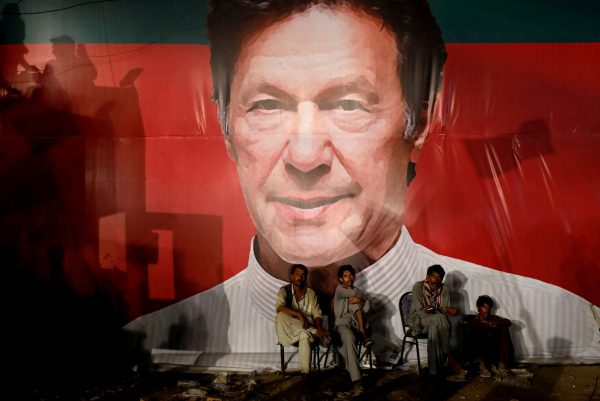Since taking office, the new government has made a show of committing itself to populist cost-cutting measures, such as renouncing security details and the use of official government residences. But these measures are overshadowed by a deteriorating balance of payments position, looming debt repayment obligations and chronic energy sector woes — all of which will constrain the government’s options during the early months of the new term.
Interest on external government borrowing, stagnating exports, a mounting import bill and an overvalued Pakistani rupee have all contributed to the precipitous decline of Pakistan’s foreign currency reserves over the past two years. These reserves were built up during the first half of the PML-N’s five-year tenure when the government entered into an International Monetary Fund (IMF) loan program shortly after taking office.
Pakistani finance ministry officials estimate the country’s external debt repayment obligations for the 2018–19 fiscal year to total at least US$9.3 billion, against US$10.2 billion in reserves held by the State Bank of Pakistan (SBP) as of the week following the July elections. Reserves have fallen further since and despite several moves by the SBP to depreciate the Pakistani rupee and raise interest rates, Pakistan’s current account deficit is projected to widen further in the coming quarters.
Newly appointed Pakistani Finance Minister Asad Umar has stated that the government is reviewing multiple potential remedies, including a return to the IMF. On 18 September, Umar unveiled an initial package of mid-term amendments to the current fiscal budget that includes cuts to development spending, increased tariffs on some categories of luxury imports and a reversal of some income tax reductions made by the previous government.
An IMF staff-level negotiating team is expected to visit Pakistan at the end of September, but a new loan may not be easy to come by given Pakistan’s difficult strategic environment. The Trump administration has taken a hard line on assistance to Pakistan over the past year. Washington has frozen security assistance to Pakistan, halted payments under the Coalition Support Fund program and worked in conjunction with the international Financial Action Task Force to add Pakistan to a global watch list over its failure to curtail the operations of militant groups.
In late July, US Secretary of State Mike Pompeo explicitly warned against the use of IMF funds to ‘bail out Chinese bondholders or China itself’ for the repayment of external debts incurred through the China–Pakistan Economic Corridor (CPEC) project. Although readouts from Pompeo’s visit to Pakistan at the beginning of the month were less confrontational, US officials have not confirmed Pakistani accounts that Pompeo pledged not to interfere in an IMF loan.
US–Pakistan relations have been strained by disputes over counterterrorism priorities for years, but Pakistan’s tightening strategic relationship with Beijing risks entangling it in the United States’ larger confrontation with China. Pakistan may be forced to choose between two countries with whom it would otherwise seek to maintain complementary partnerships.
Pompeo’s trip to Islamabad was followed immediately afterwards by a visit from Chinese Foreign Minister Wang Yi who reaffirmed bilateral ties between the countries. China provided more than US$4 billion in loans to Pakistan during the preceding fiscal year, and Pakistani officials seek to shield CPEC project terms from IMF scrutiny by continuing to tap Chinese lenders.
Shortly after the new government took office, China reportedly agreed to another US$2 billion in lending, but no specific announcements on this or other financing pledges were made during Wang’s visit. Instead, his meetings were overshadowed by suggestions from PTI Commerce Advisor Abdul Razak Dawood that the new government is seeking to renegotiate or review CPEC projects. Chinese and Pakistani officials subsequently rebuffed these comments, but they reflect the tensions among Pakistan’s political and business elites over the distribution of gains from Chinese investments.
Pakistani leaders are also seeking to secure additional financial support from Saudi Arabia, although doing so may limit the new government’s professed desire to negotiate a more balanced position between Riyadh and Iran. On his first official travel since taking office, Khan visited Saudi Arabia and the United Arab Emirates but no immediate pledges of new financial support were announced during his trip.
During the campaign period and since taking office, Khan and his aides have vowed to pursue an aggressive anti-corruption agenda. They emphasise the recovery of overseas assets and the alleged undeclared wealth of their elite rivals as the primary means through which to repair the country’s ills. While a politically potent message, Pakistan’s economic and strategic challenges are unlikely to be so easily resolved and risk a rocky start for the new government.
Colin Cookman is a program officer at the United States Institute of Peace, where he manages and supports the Asia Center publications portfolio and conducts analysis on the politics and security of Pakistan and Afghanistan and on US policy in the region. The views expressed here are his own. Colin is on Twitter @colincookman.


Good analysis but the main reason of estrangement between Pakistan and the US is because the latter has not achieved its objectives for which it invaded Afghanistan in 2001. Pakistan was declared as a non-Nato ally but as the US failed to eliminate terrorism in 17 years course of the war. It is putting all the blame on Pakistan.